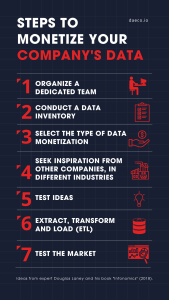Data is your most valuable asset for driving business transformation. It’s time to make your data provide even more tangible value through data monetization.

What is Data Monetization?
Data monetization is the process of utilizing data to procure economic benefits. Direct or external data monetization involves selling data to third parties independently or via a broker, data sharing to obtain beneficial business terms and conditions, and offering information services or products.
Why Data Monetization Is Important
By investing in a company’s data collection, organizations can achieve higher revenues. Good data monetization strategies guarantee that organizations get the most value from their data both internally and externally. They can sell the data externally and increase profits, minimize costs internally, and optimize opportunities for the organization.
In today’s world, driven by digitization and information, data has become one of the most valuable assets for organizations. While many companies already collect, store, and analyze data to drive strategic decisions, few have fully explored the possibility of monetizing this asset directly. This is a huge opportunity that Douglas Laney explores in his book Infonomics (2018).
Why consider data as a monetizable asset?
The value of data lies not simply in its possession, but in its strategic use. By monetizing data, organizations can not only gain an additional revenue stream, but also improve operational efficiency, discover new market opportunities, and promote innovation.
But how is this achieved? Laney proposes a 7-step process:
-
Organize a dedicated team:
Data is a complex asset that requires expert management. Therefore, the first step to monetize data is to assemble a dedicated team composed of data experts, analysts, data scientists, and strategic decision-makers. This team must have the ability to understand the data and its potential, and guide the monetization strategy.
-
Conduct a data inventory:
Before you can monetize your data, you need to know what data you have. Conduct a complete inventory of the data your company collects and stores, considering both quality and quantity, and the possible uses they could have.
-
Select the type of data monetization:
There are various ways to monetize data, from selling them directly to using them to improve products and services, or even to generate advertising. Choose the strategy that best fits your business model and the type of data you have.
-
Seek inspiration from other companies, in different industries:
There is no need to reinvent the wheel. Learn from the best practices of companies that have successfully monetized their data, even those in industries different from yours. Studying these cases can provide useful insights and help you avoid common mistakes.
-
Test ideas:
Once you have an idea of how you want to monetize your data, run tests. This could involve conducting data analysis, product prototypes, or even marketing campaigns. Testing will allow you to tweak your strategy before making a significant investment.
-
Extract, Transform and Load (ETL):
Raw data are rarely useful in their original form. Often, they need to be extracted from their source, transformed into a useful format, and loaded into a database or analytical platform. This process, known as ETL, is essential to prepare the data for monetization.
-
Test the market:
Finally, once you have prepared your data and your product or service, it’s time to test the market. This could involve launching a minimum viable product (MVP), running a pilot test, or starting a marketing campaign.
Even after you’ve started generating revenue from your data, it’s important to continue testing, learning, and evolving. Data, like any other asset, needs to be managed and maximized on an ongoing basis to maintain its value. By following Laney’s steps, you can turn your data into a valuable source of revenue and opportunities for your company.
Your organization’s data is valuable—it is the key to business transformation. Take the time to assess how you can use it to drive business growth and identify additional revenue streams within your organization.
Sources:
[2] https://www.jaspersoft.com/articles/what-is-data-monetization

